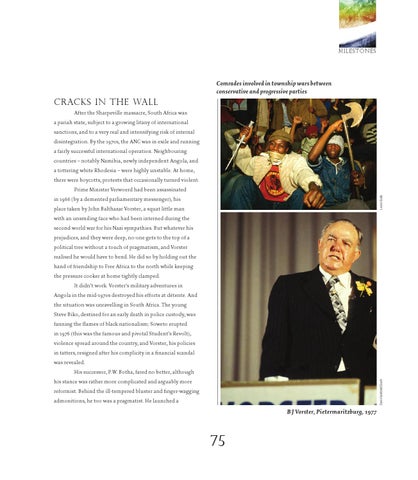MILESTONES
Comrades involved in township wars between conservative and progressive parties
Cracks in the wall
After the Sharpeville massacre, South Africa was
a pariah state, subject to a growing litany of international sanctions, and to a very real and intensifying risk of internal disintegration. By the 1970s, the ANC was in exile and running a fairly successful international operation. Neighbouring countries – notably Namibia, newly independent Angola, and a tottering white Rhodesia – were highly unstable. At home, there were boycotts, protests that occasionally turned violent. Prime Minister Verwoerd had been assassinated Louise Gubb
in 1966 (by a demented parliamentary messenger), his place taken by John Balthazar Vorster, a squat little man with an unsmiling face who had been interned during the second world war for his Nazi sympathies. But whatever his prejudices, and they were deep, no-one gets to the top of a political tree without a touch of pragmatism, and Vorster realised he would have to bend. He did so by holding out the hand of friendship to Free Africa to the north while keeping the pressure cooker at home tightly clamped.
It didn’t work. Vorster’s military adventures in
Angola in the mid-1970s destroyed his efforts at détente. And the situation was unravelling in South Africa. The young Steve Biko, destined for an early death in police custody, was fanning the flames of black nationalism; Soweto erupted in 1976 (this was the famous and pivotal Student’s Revolt), violence spread around the country, and Vorster, his policies in tatters, resigned after his complicity in a financial scandal was revealed.
His successor, P.W. Botha, fared no better, although David Goldblatt/South
his stance was rather more complicated and arguably more reformist. Behind the ill-tempered bluster and finger-wagging admonitions, he too was a pragmatist. He launched a
B J Vorster, Pietermaritzburg, 1977
75 man_times03.indd 45
12/2/08 12:25:48 PM
